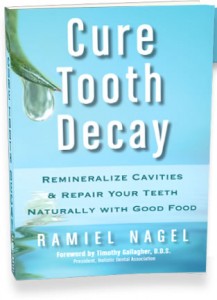 I have spent a lot of time researching and thinking about dental recalcification, so I was drawn to this book Heal Tooth Decay by Ramiel Nagel. Here are my thoughts on Nagel’s influential and informative book. The short of it: the book tells the truth as the author’s encountered it. Does its advice work for some? Yes. It doesn’t work for everyone though. I want it to, but it doesn’t.
I have spent a lot of time researching and thinking about dental recalcification, so I was drawn to this book Heal Tooth Decay by Ramiel Nagel. Here are my thoughts on Nagel’s influential and informative book. The short of it: the book tells the truth as the author’s encountered it. Does its advice work for some? Yes. It doesn’t work for everyone though. I want it to, but it doesn’t.
The nutritional advice this book gives is derived from two texts: Dr. Price’s Nutrition and Physical Degeneration and Steinman’s Dentinal Fluid Transport. I own and have thoroughly read all three books. Nagel’s book also draws heavily on his own experiences and reports he’s received of others’ similar experiences. (As an aside, I wouldn’t buy Steinman’s book unless you want to read a lot of summaries of laboratory research. It’s dry reading, for sure.)
Let me describe a scenario I’ve seen at least five times since I became a biological dentist.
A caring, attentive parent is in my office with her child — usually about four years old. In every case I’ve had, the parent has been a mom. Mom says there’s a little problem they’d like me to check out. They’re sure it can’t be decay because they brush every day, floss every day, and never eat refined foods, except at birthday parties. They just want me to figure out what’s wrong. Maybe it’s the gums?
I look in their child’s mouth and find decay. Deep decay to the pulp on multiple teeth. Once I saw an abscess.
I break the news to the parent. The response is always the same: “That’s impossible! We brush! We floss! We take cod liver oil. We eat organ meats all the time. We drink whole raw milk from a local cow that eats rapidly growing green grass.” Parents usually — and understandably — respond very emotionally: tears or anger or both.
Here’s the summary on Nagel’s book. Drawing from Price’s and Steinman’s work, he says that teeth will naturally recalcify (heal) if your nutrition is right. I won’t go into the specific advice for now. It does work for many people. I think the basic premise — that processed food is bad and whole food is good — is great for everyone. Price’s work focused more on processed food vs whole food and later on specific nutrients found from animal sources. Steinman’s work is more contemporary: nutrition on lab rats with accompanying data trying to correlate rat dental physiology with human dental physiology.
Now let’s back up a step. Let me be clear on this one: I want the substance of this book to be true. I want it so much that I’ve done recalcification attempts with many patients. If I could successfully and predictably recalcify all my patients’ teeth, I’d be a far more successful dentist than one who does fillings and crowns. Here’s what I’ve discovered about the approaches presented in these texts:
Recalcification attempts on baby teeth have worked with my patients (25 – 30 cases) about ⅓ of the time.
Recalcification attempts on permanent teeth have worked about half of the time (in about 50 cases).
Genetics definitely plays a role. Some people have bullet-proof dental genes: they can eat processed foods all day long, never floss or brush, and have a healthy mouth. Other people do all they can and their teeth still tank.
Both Weston Price and Nagel present their advice pretty absolutely: that is, “do A, and you will get B.” Many of the studies Dr. Price cites report very high success rates: upwards of 90% even on kids. Nagel’s own experience was very successful; his teeth recalcified and he avoided dental treatment.
I have ideas about the data discrepancy:
Some of Price’s studies happened in institutional settings, offering better control of nutritional variables.
Price’s basic scientific approach may be partially flawed: he began by searching for his desired outcomes (societies with healthy mouths), and then working backward to discover nutritional similarities between those societies. These societies probably had similar genetic information. Price’s work was published before the flowering of gene theory, so it was easier to telescope findings to the more genetically diverse populace.
Epigenetics may have changed us? It’s more than one generation later. Think Pottenger.
What I don’t like about Nagel’s book is the conspiratorial tone he projects on dental professionals. Good for him and thousands of others who’ve healed their teeth. But he acts like dentists know more than they do regarding this healing — and he acts like it’s much more predictable than I’ve seen it work. It also bothers me that he acts like dentists are trying to deceive their patients — rip everyone off. A dentist’s mission is to advise someone how to predictably make their mouth healthier — and to help them in the restoration if the patient so chooses. The problem is that dentists aren’t taught much if anything about nutrition and oral health other than “stay away from sticky sweets.” His stick-it-to-the-dentist tone tires me. *sigh.* I wish I could show him the failed recalcification cases.
In short? Yes. Follow the nutritional advice. I hope it works for you.
Dr. Scott Taylor





Speak Your Mind